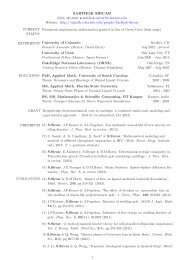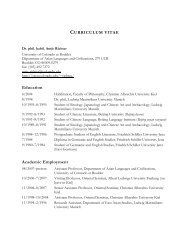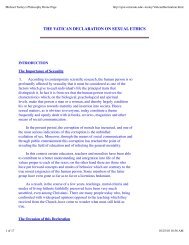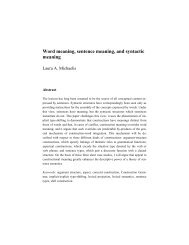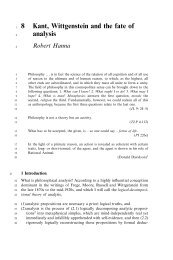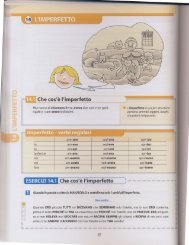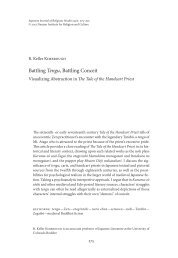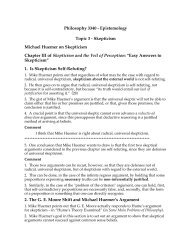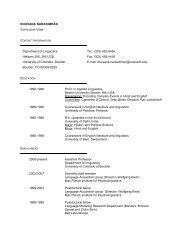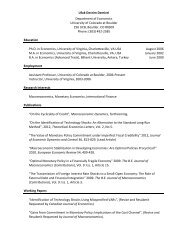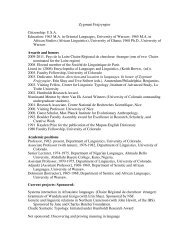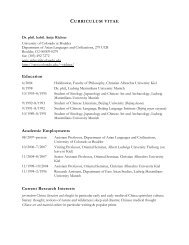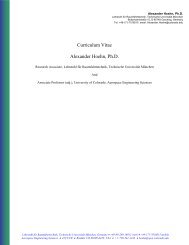The Tale of the Fuji Cave - Nanzan Institute for Religion and Culture
The Tale of the Fuji Cave - Nanzan Institute for Religion and Culture
The Tale of the Fuji Cave - Nanzan Institute for Religion and Culture
You also want an ePaper? Increase the reach of your titles
YUMPU automatically turns print PDFs into web optimized ePapers that Google loves.
Japanese Journal <strong>of</strong> Religious Studies [Online only: 1–22]<br />
© 2006 <strong>Nanzan</strong> <strong>Institute</strong> <strong>for</strong> <strong>Religion</strong> <strong>and</strong> <strong>Culture</strong><br />
R. Keller Kimbrough<br />
translation<br />
<strong>The</strong> <strong>Tale</strong> <strong>of</strong> <strong>the</strong> <strong>Fuji</strong> <strong>Cave</strong><br />
R. Keller Kimbrough is an assistant pr<strong>of</strong>essor <strong>of</strong> Japanese Literature at <strong>the</strong> University <strong>of</strong><br />
Colorado at Boulder. He would like to thank Minobe Shigekatsu <strong>and</strong> Paul Atkins <strong>for</strong> <strong>the</strong>ir<br />
many insightful comments <strong>and</strong> advice.<br />
1
kimbrough: <strong>the</strong> tale <strong>of</strong> <strong>the</strong> fuji cave | 7<br />
Such were Nitta’s thoughts.<br />
Nitta’s attire that day was exceptionally gr<strong>and</strong>. He wore an unlined inner<br />
garment with a lattice design, loosened at <strong>the</strong> sides, <strong>and</strong> a finely woven silk<br />
hitatare with <strong>the</strong> sleeves hitched back at <strong>the</strong> shoulders. On his head he wore a<br />
court cap, laced on tight, <strong>and</strong> at his waist he carried a great Mōbusa sword, 16 a<br />
short sword in a white ribbed sheath, <strong>and</strong> a crimson-edged fan. <strong>The</strong> Kamakura<br />
shōgun assigned him a retainer: a certain Kudō Saemon no Suke, whom Nitta<br />
had carry a bundle <strong>of</strong> sixteen torches. After declaring his intention to return at<br />
noon, seven days later, Nitta <strong>and</strong> his man entered <strong>the</strong> cave.<br />
Nitta walked some hundred yards, but <strong>the</strong>re was nothing to be seen, no lady<br />
weaving at a loom. Drawing <strong>the</strong> great sword from his waist, he br<strong>and</strong>ished it<br />
in <strong>the</strong> four directions <strong>and</strong> continued on his way. 17 After what seemed like six<br />
or seven hundred yards, Nitta came to a place where <strong>the</strong> moon appeared in<br />
<strong>the</strong> sky, just like in Japan. A multi-hued pine <strong>for</strong>est <strong>of</strong> blue, yellow, red, white,<br />
<strong>and</strong> black spread across <strong>the</strong> l<strong>and</strong>. <strong>The</strong>re was a small stream with footprints in<br />
<strong>the</strong> bed, from which Nitta surmised that someone had recently made his way<br />
across. Nitta traversed <strong>the</strong> stream, <strong>and</strong> he saw a succession <strong>of</strong> nine eight-ridged<br />
palaces with cypress bark ro<strong>of</strong>s.<br />
Nitta entered <strong>the</strong> palace grounds. Water dripped from <strong>the</strong> eaves with a sound<br />
like that <strong>of</strong> ge-ke-shu-jō—“<strong>the</strong> salvation <strong>of</strong> all sentient beings”—played upon a<br />
lute, <strong>and</strong> <strong>the</strong> rustling sound <strong>of</strong> wind in <strong>the</strong> pines was such as to awaken a person<br />
from <strong>the</strong> cycle <strong>of</strong> birth <strong>and</strong> death. Proceeding fur<strong>the</strong>r inside, Nitta saw hanging<br />
str<strong>and</strong>s <strong>of</strong> threaded jewels. Night <strong>and</strong> day were as one, distinguishable only by<br />
<strong>the</strong> periodic opening <strong>and</strong> closing <strong>of</strong> lotus blossoms. In one place Nitta found<br />
a lute left st<strong>and</strong>ing as if it had just been played. <strong>The</strong> ceilings were draped with<br />
sheets <strong>of</strong> red-ground brocade, <strong>and</strong> <strong>the</strong> pillars were wrapped in similar bolts<br />
<strong>of</strong> blue. <strong>The</strong> red <strong>and</strong> blue brocade was in turn adorned with gold <strong>and</strong> silver.<br />
When Nitta <strong>and</strong> his companion spoke, <strong>the</strong>ir voices echoed like <strong>the</strong> bells <strong>of</strong> Gion<br />
Shōja, 18 beyond <strong>the</strong> heart to fathom or words to express. Supposing that he had<br />
arrived in <strong>the</strong> Pure L<strong>and</strong>, Nitta was overjoyed.<br />
Exploring a road that ran to <strong>the</strong> nor<strong>the</strong>ast, Nitta found a lake with an isl<strong>and</strong>.<br />
<strong>The</strong>re was a palace <strong>the</strong>re that glowed with <strong>the</strong> radiant light <strong>of</strong> Jambu River gold. 19<br />
A bridge with eighty-nine sections connected <strong>the</strong> isl<strong>and</strong> to <strong>the</strong> shore, <strong>and</strong> <strong>for</strong> <strong>the</strong><br />
eighty-nine sections <strong>the</strong>re were eighty-nine bells. <strong>The</strong> first bell rang <strong>the</strong> name<br />
16. According to <strong>the</strong> Keiō <strong>and</strong> 1627 <strong>Fuji</strong> texts, “a sword made by Mōbusa [Mōfusa],” who is o<strong>the</strong>rwise<br />
unknown.<br />
17. It was believed that by br<strong>and</strong>ishing a sword, a traveler could expose hidden malevolent spirits.<br />
18. <strong>The</strong> legendary bells at <strong>the</strong> Indian temple where Shakyamuni Buddha is said to have preached.<br />
19. <strong>The</strong> word “palace” is interpolated from <strong>the</strong> 1607 <strong>Fuji</strong> text. <strong>The</strong> Jambu River runs through <strong>the</strong><br />
great mango <strong>for</strong>est in nor<strong>the</strong>rn Jambudvīpa, which, in Buddhist cosmology, is <strong>the</strong> isl<strong>and</strong>-continent at<br />
<strong>the</strong> foot <strong>of</strong> Mount Sumeru inhabited by human beings. <strong>The</strong> Jambu River is known <strong>for</strong> its purple gold.<br />
Inagaki 1995, 403; Nakamura 2001, 1: 146d.
16 | Japanese Journal <strong>of</strong> Religious Studies 33/2 (2006)—supplement<br />
blameless servant or child. Women like her will be burned <strong>and</strong> charred in this<br />
way <strong>for</strong> four hundred thous<strong>and</strong> kalpas. 48 If someone comes at mealtime <strong>and</strong><br />
you give <strong>the</strong>m food, it’s <strong>the</strong> same as making a Buddhist <strong>of</strong>fering. You’ll earn<br />
enormous merit <strong>and</strong> become rich in <strong>the</strong> present life.”<br />
Looking in ano<strong>the</strong>r direction, Nitta saw a woman with hair that was three<br />
hundred yards long. Demons were setting fire to <strong>the</strong> ends <strong>and</strong> burning it all up.<br />
“What’s this?” Nitta asked.<br />
“When she was in <strong>the</strong> human world, she used to wish <strong>for</strong> a thous<strong>and</strong> new<br />
str<strong>and</strong>s <strong>of</strong> hair <strong>for</strong> every str<strong>and</strong> that she lost. Now she’ll spend nine thous<strong>and</strong><br />
years having her <strong>for</strong>ehead burned with hot iron roundweights. 49<br />
“It’s an infinitely terrible sin <strong>for</strong> a woman to be childless, <strong>and</strong> it’s a horrible<br />
sin <strong>for</strong> a woman with only one child not to bear any more. Also, it’s very bad <strong>for</strong><br />
a woman not to have her period. If such women become wealthy <strong>and</strong> still fail<br />
to plant good karmic roots—if <strong>the</strong>y want more than what <strong>the</strong>y already have,<br />
or want to wear more robes than <strong>the</strong>y’re already wearing—<strong>the</strong>n when <strong>the</strong>y die,<br />
<strong>the</strong>y’ll be like leaves blown from a tree. If you have wealth like that, your first<br />
thoughts should be <strong>for</strong> <strong>the</strong> next life, <strong>and</strong> you should plant good roots. People<br />
with children are likely to receive some benefit in <strong>the</strong> world to come, although it<br />
depends <strong>of</strong> course on <strong>the</strong> children. And even so, <strong>the</strong>re aren’t many children who<br />
pray enough to get <strong>the</strong>ir parents out <strong>of</strong> hell.”<br />
Nitta saw a demon hacking <strong>of</strong>f a man’s arms <strong>and</strong> legs with an adze. “That<br />
man cut down trees <strong>and</strong> grasses <strong>for</strong> no reason at all, <strong>and</strong> he let <strong>the</strong>m wi<strong>the</strong>r <strong>and</strong><br />
die. He’ll be tortured to no end.”<br />
Saying that he would show him <strong>the</strong> realm <strong>of</strong> hungry ghosts, <strong>the</strong> Bodhisattva<br />
led Nitta fur<strong>the</strong>r on. <strong>The</strong> sinners <strong>the</strong>re had bellies as vast as oceans, necks as<br />
thin as threads, <strong>and</strong> heads as large as Mount Sumeru. 50 <strong>The</strong>re was food be<strong>for</strong>e<br />
<strong>the</strong>m, but when <strong>the</strong>y tried to eat it, it burst into flames. Unable to consume<br />
a single thing, <strong>the</strong>y were tormented by hunger, day <strong>and</strong> night. “<strong>The</strong>se people<br />
were wealthy in <strong>the</strong>ir <strong>for</strong>mer lives, but <strong>the</strong>y didn’t share <strong>the</strong>ir riches with o<strong>the</strong>rs,<br />
or even allow <strong>the</strong>mselves to eat. <strong>The</strong>y reveled in <strong>the</strong>ir coins <strong>and</strong> grain, <strong>for</strong>cing<br />
<strong>the</strong>mselves all <strong>the</strong> while to endure hunger <strong>and</strong> cold. People like <strong>the</strong>m will fall<br />
into <strong>the</strong> realm <strong>of</strong> hungry ghosts, where <strong>the</strong>y’ll suffer without cease <strong>for</strong> five hundred<br />
thous<strong>and</strong> kalpas.<br />
“Nitta, tell everyone back in <strong>the</strong> human world: whe<strong>the</strong>r you’re rich or poor,<br />
you’ll find wealth if you clean your rooms, maintain your clo<strong>the</strong>s, prepare proper<br />
48. <strong>The</strong> 1607 <strong>and</strong> 1627 <strong>Fuji</strong> texts explain that <strong>the</strong> woman would ignore visitors by hiding her head<br />
in her kettle, which is why she is punished in <strong>the</strong> way that she is.<br />
49. According to <strong>the</strong> Keiō <strong>and</strong> 1607 <strong>Fuji</strong> texts, <strong>the</strong> woman was having nails pounded into her <strong>for</strong>ehead.<br />
<strong>The</strong> 1607 <strong>and</strong> 1627 <strong>Fuji</strong> texts explain that her punishment was <strong>for</strong> <strong>the</strong> sin <strong>of</strong> envying <strong>the</strong> length<br />
<strong>of</strong> o<strong>the</strong>r women’s hair.<br />
50. This <strong>and</strong> <strong>the</strong> following two sentences are translated from <strong>the</strong> Keiō <strong>Fuji</strong> manuscript, which in<br />
this part is more complete than <strong>the</strong> 1603 <strong>Fuji</strong> text.
kimbrough: <strong>the</strong> tale <strong>of</strong> <strong>the</strong> fuji cave | 17<br />
food, feed o<strong>the</strong>rs <strong>and</strong> also feed yourself. <strong>The</strong> world is no more than what we see<br />
in a dream. If you failed to plant good roots in <strong>the</strong> past <strong>and</strong> resent rich people in<br />
<strong>the</strong> present, you’ll fall into <strong>the</strong> realm <strong>of</strong> hungry ghosts.” 51<br />
<strong>The</strong>re was a hungry ghost who was giving birth to children, <strong>the</strong>n ripping<br />
<strong>the</strong>m apart <strong>and</strong> eating <strong>the</strong>m. “This is <strong>the</strong> punishment <strong>for</strong> people who feed <strong>the</strong>mselves<br />
by selling adolescent children, <strong>and</strong> <strong>for</strong> people who ab<strong>and</strong>on <strong>the</strong>ir babies.<br />
<strong>The</strong>y’ll suffer like this continuously <strong>for</strong> three million kalpas. No matter how<br />
much trouble children are, it’s <strong>for</strong>bidden to sell or ab<strong>and</strong>on <strong>the</strong>m.”<br />
Nitta saw a demon stuffing a sinner’s mouth with rice. Blood gushed from<br />
<strong>the</strong> sinner’s maw, <strong>and</strong> he was unable to eat. 52 “Now this person, he hated giving<br />
things to o<strong>the</strong>rs. People like him will all fall into <strong>the</strong> realm <strong>of</strong> hungry ghosts <strong>for</strong><br />
a very long time.”<br />
Nitta <strong>and</strong> <strong>the</strong> Bodhisattva came to a crossroads where <strong>the</strong>y saw a man with<br />
Jizō <strong>and</strong> Taishaku. “That’s <strong>the</strong> Hirata Priest, o<strong>the</strong>rwise known as Myōshinbō,<br />
from <strong>the</strong> Hirata district <strong>of</strong> Mikawa province. He <strong>and</strong> his wife didn’t have any<br />
children in <strong>the</strong> human realm, so <strong>the</strong>y decided to renounce <strong>the</strong> world <strong>and</strong> pray<br />
<strong>for</strong> <strong>the</strong>ir lives to come. <strong>The</strong>y took holy orders, <strong>and</strong> now <strong>the</strong>y’re on <strong>the</strong>ir way to<br />
<strong>the</strong> Pure L<strong>and</strong> <strong>of</strong> Nine Grades. <strong>The</strong> buddhas <strong>of</strong> <strong>the</strong> three ages have all ga<strong>the</strong>red<br />
<strong>the</strong>re to build <strong>the</strong>m a golden hall.” 53<br />
Examining <strong>the</strong> animal realm, Nitta saw all <strong>the</strong> birds <strong>of</strong> <strong>the</strong> sky <strong>and</strong> beasts<br />
<strong>of</strong> <strong>the</strong> earth spliced toge<strong>the</strong>r in disturbing combinations. “This is what happens<br />
to children who are overly attached to <strong>the</strong>ir parents, <strong>and</strong> to people who<br />
are overly attached to <strong>the</strong>ir stepmo<strong>the</strong>rs or stepchildren. <strong>The</strong>y all fall into <strong>the</strong><br />
animal realm.”<br />
Nitta looked into <strong>the</strong> ashura realm. He saw tremendous flames rising up into<br />
<strong>the</strong> air, <strong>and</strong> warriors armed with bows <strong>and</strong> blades engaged in ceaseless fighting.<br />
“People who die in battle fall into <strong>the</strong> ashura realm, where <strong>the</strong>y suffer <strong>for</strong> two<br />
thous<strong>and</strong> three hundred years.”<br />
After showing him <strong>the</strong> Six Realms <strong>of</strong> hell, hungry ghosts, animals, ashura,<br />
humans, <strong>and</strong> heaven, <strong>the</strong> Bodhisattva took Nitta under his arm <strong>and</strong> led him to<br />
Enma’s court. <strong>The</strong>re was a golden palace hall <strong>the</strong>re where <strong>the</strong> Ten Kings dwelled.<br />
Birth companion deities had recorded <strong>the</strong> deeds <strong>of</strong> <strong>the</strong> righteous in tablets <strong>of</strong><br />
gold, <strong>and</strong> those <strong>of</strong> <strong>the</strong> wicked in tablets <strong>of</strong> iron. <strong>The</strong>re were demons shouting,<br />
“Look here, sinner! I’ll show you all <strong>the</strong> crimes you committed since you were<br />
seven!” <strong>The</strong>y were <strong>for</strong>cing sinners to gaze upon <strong>the</strong> iron tablets. When <strong>the</strong> sinners<br />
protested that <strong>the</strong>y were not guilty <strong>of</strong> so many crimes, <strong>the</strong> demons declared,<br />
51. <strong>The</strong> Keiō <strong>Fuji</strong> text alternately explains: “People who were born poor because <strong>the</strong>y failed to plant<br />
good roots in <strong>the</strong>ir previous lives, who envy <strong>the</strong> rich because <strong>the</strong>y <strong>the</strong>mselves do not succeed, <strong>and</strong><br />
who long to possess everything <strong>the</strong>y see—<strong>the</strong>y are <strong>the</strong> hungry ghosts <strong>of</strong> this present [human] world.”<br />
52. According to <strong>the</strong> 1607 <strong>Fuji</strong> text, <strong>the</strong> demon was also sewing <strong>the</strong> sinner’s mouth shut with iron<br />
thread, pounding nails into his cheeks, <strong>and</strong> piercing his throat with needles.<br />
53. <strong>The</strong> three ages are <strong>the</strong> past, <strong>the</strong> present, <strong>and</strong> <strong>the</strong> future.
18 | Japanese Journal <strong>of</strong> Religious Studies 33/2 (2006)—supplement<br />
“<strong>The</strong>n we’ll weigh you on <strong>the</strong> karma scale!” <strong>and</strong> <strong>the</strong>y did just that. For sinners<br />
who continued to protest, <strong>the</strong> demons <strong>of</strong>fered to show <strong>the</strong>m <strong>the</strong> Jōhari Mirror,<br />
which reveals all <strong>of</strong> a person’s crimes <strong>and</strong> transgressions from <strong>the</strong> age <strong>of</strong><br />
seven. Be<strong>for</strong>e <strong>the</strong> mirror, <strong>the</strong> sinners were unable to argue any fur<strong>the</strong>r. Falling<br />
to <strong>the</strong> ground, <strong>the</strong>y pressed <strong>the</strong>ir faces to <strong>the</strong> earth <strong>and</strong> cried, “Save me, Buddha,<br />
please!”<br />
<strong>The</strong> Ten Kings would ask, “Did you have a child in <strong>the</strong> human world?” Those<br />
who answered yes would be taken from <strong>the</strong> demons <strong>and</strong> set to <strong>the</strong> side; those<br />
who answered no would be dropped right down into <strong>the</strong> Hell <strong>of</strong> No Respite. 54<br />
“Listen, Nitta,” <strong>the</strong> Bodhisattva said. “Read dharani <strong>and</strong> <strong>the</strong> sutras, recite <strong>the</strong><br />
nenbutsu with unwavering concentration, <strong>and</strong> avoid hating or envying o<strong>the</strong>rs<br />
without good cause. And always show compassion. <strong>The</strong> Ten Kings revere those<br />
who do.” 55<br />
Nitta saw some sinners being mashed up in an iron mortar. He also saw <strong>the</strong><br />
Ten Kings rising from <strong>the</strong>ir seats to pay homage to a nenbutsu practitioner<br />
<strong>and</strong> send him on to <strong>the</strong> Pure L<strong>and</strong>. <strong>The</strong>re were also demons using iron bows to<br />
shoot a priest full <strong>of</strong> arrows, one after ano<strong>the</strong>r, with a cruelty that was difficult to<br />
watch. “That man pretended to know a sutra that he didn’t. Priests like him who<br />
eat <strong>of</strong>ferings, accept alms, <strong>and</strong> allow <strong>the</strong>mselves to be honored will be made to<br />
suffer in this way.”<br />
<strong>The</strong> Bodhisattva addressed himself to <strong>the</strong> people at large: “Listen, sinners.<br />
If no one in <strong>the</strong> human world prays <strong>for</strong> you on any <strong>of</strong> <strong>the</strong> seventh, fourteenth,<br />
thirty-fifth, <strong>for</strong>ty-ninth, or hundredth days after you die….” 56<br />
“We’ll drop you into <strong>the</strong> Hell <strong>of</strong> No Respite!” <strong>the</strong> demons shouted.<br />
Hearing <strong>the</strong>se words, <strong>the</strong> Ten Kings wept <strong>and</strong> spoke: “See here, demons, at<br />
least wait until <strong>the</strong> third year!”<br />
“If no one prays <strong>for</strong> <strong>the</strong>m by <strong>the</strong>n, we’ll take <strong>the</strong>m <strong>and</strong> dump <strong>the</strong>m into hell!”<br />
“<strong>The</strong>n wait until <strong>the</strong> seventh year,” <strong>the</strong> Ten Kings said. “And if <strong>the</strong>y don’t<br />
receive prayers by <strong>the</strong>n, <strong>the</strong>n wait until <strong>the</strong> thirteenth year.” <strong>The</strong> Kings agreed<br />
that if by that time <strong>the</strong> sinners had still not received any prayers, <strong>the</strong>y would<br />
release <strong>the</strong>m to <strong>the</strong> demons, who, sad to say, would drop <strong>the</strong>m into <strong>the</strong> Hell <strong>of</strong><br />
No Respite. Turning back to <strong>the</strong> Ten Kings, <strong>the</strong> sinners cried, “Oh, Ten Kings,<br />
please save us!”<br />
<strong>The</strong> Bodhisattva spoke: “Well, Nitta, that’s pretty much <strong>the</strong> gist <strong>of</strong> hell. Shall I<br />
54. <strong>The</strong> 1627 <strong>Fuji</strong> text explains that because sinners with children might receive prayers from<br />
<strong>the</strong> human world, <strong>the</strong> Ten Kings delay <strong>the</strong>ir judgment until such prayers have (or have not) been<br />
received.<br />
55. <strong>The</strong> Bodhisattva’s advice here is interpolated from <strong>the</strong> 1607 <strong>Fuji</strong> text. In <strong>the</strong> 1603 text, <strong>the</strong> Bodhisattva<br />
simply advises Nitta to always show compassion. Dharani are magical Buddhist incantations,<br />
<strong>and</strong> <strong>the</strong> nenbutsu is <strong>the</strong> ritual invocation <strong>of</strong> Amida Buddha’s name.<br />
56. Due to an apparent textual corruption, <strong>the</strong> Bodhisattva’s sentence is left unfinished. In <strong>the</strong><br />
o<strong>the</strong>r early <strong>Fuji</strong> texts, <strong>the</strong> Bodhisattva makes no such statement.



